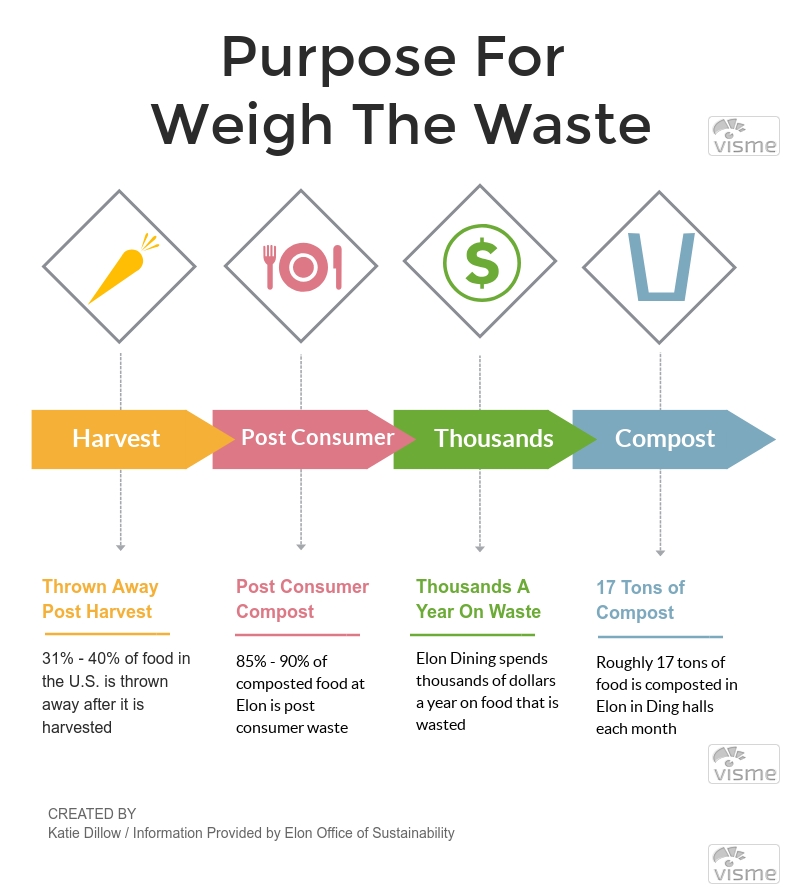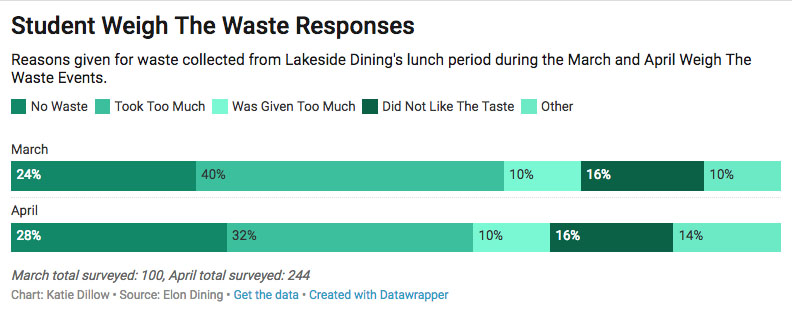The Weight Of Waste At Elon University
Elon Dining and The Office of Sustainability partner to bring awareness to food waste on campus.
By Katie Dillow
Aoril 25, 2018
Food waste is any part of food that is not consumed, and in the case of Elon Dining, all of this is composted. “Food waste touches on all three aspects of sustainability: environmental, social, and economic, or as we like to say at Elon: people, planet, and prosperity,” says Kelly Harer the Assistant Director of Sustainability for Education and Outreach at Elon University. The Office of Sustainability has partnered with Elon Dining to monitor food waste on campus through monthly Weigh The Waste Events. Harer says that it just made sense to partner with Elon Dining, “Elon Dining offers many compostables, such as the to-go containers at Lakeside and the Coke cups at Winter Garden, among other things). The Eco-Reps did a behind-the-scenes tour of Lakeside and learned that the majority of food waste that we compost is post-consumer, meaning it is food that is left over on students’ plates after they are finished eating.”
The knowledge of a high level of post-consumer waste has been a major drive for Weigh The Waste, to educate students on their responsibility when it comes to reducing waste production on campus. “Food waste isn’t something every member of the Elon community thinks about on a daily basis,” says Harer. “ When we’re forced to actually scrape our food waste into a giant bin and see how much we’re truly wasting as a community, it really has an impact.” During weigh the waste all waste from the dining hall throughout the three hour lunch period is collected in containers and weighed right in front of students.

During the March Weigh The Waste 131 pounds of food was collected in Lakeside Dining hall during the lunch period, coming out to about 2.7 ounces a person per data collected at Weigh The Waste. Weigh The Waste events have now been implemented every month in Elon Dining Locations with the goal to see less waste each month says explains Harer.
Kate Pearce is a Senior at Elon University and the Eco-Rep coordinator for the Office of Sustainability. “The purpose of Weigh The Waste is to show students how much food is wasted and encourage students to reduce how much they take in dining halls,” says Pearce. She explains that 85%-90% of Elon’s waste is post-consumer, meaning it comes from food that is thrown away after a meal. This leaves the other 10%-15% to be from production and retail which, such as peels and scraps left after preparing a meal. Pearce says that this information is why she believes, “Weigh The Waste is important for Elon Students.” Pearce was collecting and surveying students throughout the March weigh the waste event. She says that something about dumping food into big plastic bins made students really think about what was happening.
“Many students said that they felt bad about the amount of food they were throwing in the bins,” she says about her Weigh the Waste experience. “While that is not our point to make them feel bad, it is important that students are realizing the purpose of the event and walking away from the event thinking deeper about how much they have wasted.”
“Limiting food waste is really the responsibility of the students, faculty, and staff eating on campus.”— Kelly Harer, Assistant Director of Sustainability for Education and Outreach at Elon University
Pearce also points out that the location at Elon also matters to why monitoring waste is vital. “Food waste is definitely a problem on campus and in general. We produce roughly $165 billion dollars worth of food waste each year in the United States, yet 1 in 5 people in Alamance County are food insecure.” Pearce continues that as a campus we need to do a better job at reducing waste in order to better distribute food resources to each person in the United States. She says, “I believe that the best lesson that can be learned from dining hall waste collection is that if we all work to reduce food waste then it makes a large impact. The most important thing I tell all students is that one action makes a difference if all students are taking that action. Therefore it is important to take an action, such as reducing how much food you take from a Dining Hall.”

Amanda Cerra, Elon Dinings Registered Dietitian and Sustainability Champion, says that partnering with the Office of Sustainability for Weigh the Waste was a “no-brainer” for Elon Dining. She says that looking at sustainability from her role as a dietician the message she would like to send is that, “students should try and be mindful of the importance of overeating.” Since the main waste response from student surveys was students taking too much food Cerra wants to stress that, “students can always go back for more, the food is always going to be all you can eat.”
Elon dining has taken all the student responses and given data to the correct members of dining hall staff, and Cerra has her own ideas for programs.”I think students want to try different foods but they are given a regular portion and if they don’t like it then it’s a whole plate of food being wasted,” says Cerra. Cerra’s idea of implementing a “Try Me Program” would be a step towards limiting the amount of post-consumer waste. “This would involve working with our staff, that is the face of the food so that when a student comes up and is a bit more hesitant they can be encouraged to try the dish instead of immediately being given a full serving.”
As to the success of this months Weigh the Waste Cerra says, “it went great,” and the results reflected her sentiment. With about twice as many students entering the dining hall the waste was less than the results of March’s weigh in. Cerra says more marketing was placed on April’s Weigh the Waste so, “the students knew about it which prevented food waste but at the same time maybe if we were not promoting it then there would have been more waste.”
Though the front of house weighing is only once a month this happens every day in the back of the dining halls. Dining services composts food waste everyday, “we work with Brooks Contracting and they come on a weekly basis to take our compost and repurpose it,” says Cerra. Elon’s compost is turned into topsoil that is then sold in the local community.
Elon Dining and The Office of Sustainability are continuously working to limit food waste on campus, promote composting, and educate about post-consumer waste. From March to April the two events have seemed to make a large difference on campus but continued education is the focus of both organizations. There will be a final Spring semester Weigh the Waste in May as the efforts to limit food waste on Elon’s campus are continued.